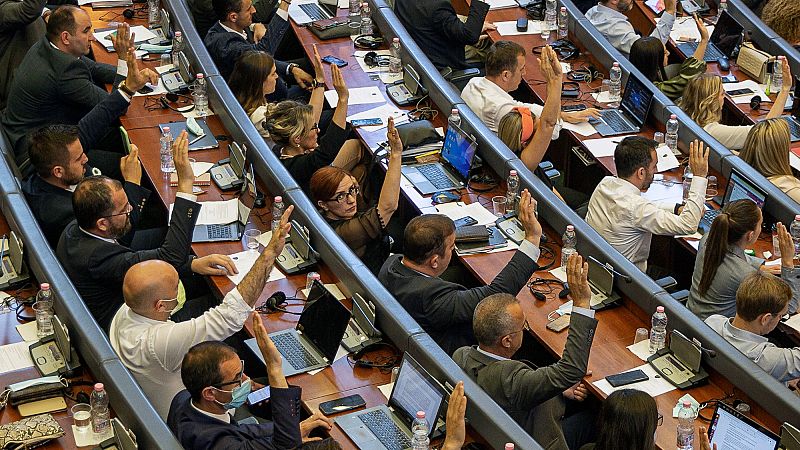Kosovo court faces deadline to end six-month parliamentary deadlock

Kosovo's Constitutional Court faces a Friday deadline to clarify the voting method for the parliament speaker and determine whether the 30-day constitutional deadline for assembly formation has expired after dozens of failed attempts to elect its leadership.
The court imposed a temporary measure on 24 July prohibiting deputies from acting to constitute the assembly until 8 August, when the restriction expires and a new ruling is expected.
Prime Minister Albin Kurti's left-leaning Vetëvendosje or Self-Determination party won 48 seats in February's election but failed to secure the majority needed in the 120-member parliament.
Scores of consecutive votes failed since the constitutive session on 15 April, with opposition parties blocking the vote. The incumbent PM — now in technical mandate — and his party are still seeking to avoid a repeat election.
"We are not interested in new elections, of course, if the decision is taken to go into new elections, then we'll respect that and move forward with it. The Constitutional Court sees it as the only option to come out of this situation," Saranda Bogujevci, a Vetëvendosje lawmaker, told Euronews.
The crisis centres on voting procedures, with Vetëvendosje proposing secret ballots while opposition parties demand open voting as constitutionally required.
The right-wing Democratic Party of Kosovo (PDK), centre-right Democratic League of Kosovo (LDK) and President Vjosa Osmani have all separately petitioned the Constitutional Court for clarification after its 26 June decision failed to definitively resolve the deadlock.
According to Daut Haradinaj, an MP from the conservative Alliance for the Future of Kosovo (AAK) of former Prime Minister Ramush Haradinaj, the election of Justice Minister Albulena Haxhiu as assembly speaker is another key issue in the stubborn standoff between Kurti and the opposition.
Kurti's party proposed a secret ballot as a means to an end, in an attempt to persuade some opposition MPs to vote for their candidate without sparking ire from their party leaders.
However, the opposition parties rejected this as unconstitutional, which is when the Constitutional Court entered the fray as the possible arbiter. Yet opposition lawmakers remained unconvinced that the stalemate could be resolved without snap elections.
"The only demand was for the vote to be public and for the candidate for assembly speaker to be changed. I can see that we’ll be heading to new elections soon," Haradinaj said.
“Kosovo’s institutions are being held hostage by Albin Kurti’s stubbornness. We offered our compromises, but unfortunately, the leader of the ruling party rejects the idea of cooperation,” LDK lawmaker Vlora Çitaku said.
“Kosovo and its future are far more important than the careers of Albin Kurti and Albulena Haxhiu,” Çitaku concluded.
In turn, Vetëvendosje MPs believe that a 2014 Constitutional Court decision set a legal precedent granting the party that wins the election the sole right to propose and elect the speaker of the parliament.
They also say that the opposition’s constitutional demands are simply a cover for their intent to derail another Kurti-led government.
“They refused the coalition, yes. But in my opinion, they didn't have a valid reason of why they would refuse if we're talking in the interest of the country,” Bogujevci concluded.
Today

